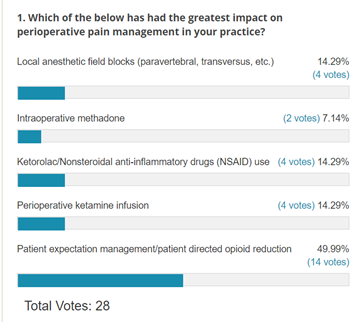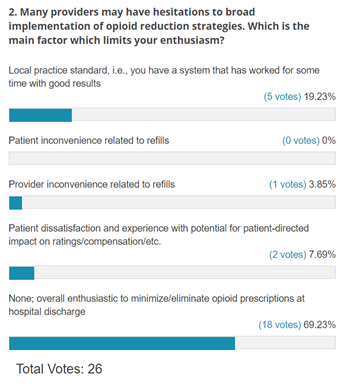Poll Results: Opioid Management Following Cardiovascular Surgery
Strategies to improve pain management while reducing the amount of opioid medications used and prescribed has been a recent focus in many cardiac surgery practices.1,2 Our recent poll sought to assess factors associated with respondents' pain management improvement strategies and potential barriers to opioid reduction.


The results of this poll indicate that expectation management related to pain control and patient directed opioid reduction requests have greatly impacted opioid reduction strategies. While the utilization of opioid reduction strategies and Enhanced Recovery after Surgery (ERAS®) pathways are critical, these results highlight an opportunity to improve patient education, opioid reduction advocacy, and support opioid reduction preoperatively and at hospital discharge. To this end, it is very encouraging to see that over two-thirds of respondents do not perceive significant barriers to implementing opioid reduction strategies.
In summary, this poll highlights that opioid reduction is a mutual goal of patients and clinicians and that there are many opportunities to continue to optimize pain management while reducing the side effects of opioids in both individual patients and our communities at large.
References
- Salenger R, Morton-Bailey V, Grant M, Gregory A, Williams JB, Engelman DT. Cardiac enhanced recovery after surgery: a guide to team building and successful implementation. Semin Thorac Cardiovasc Surg 2020;32:187–96.
- Holst KA, Dearani JA, Schaff HV, et al. What drives opioid prescriptions after cardiac operation, practice or patient? Ann Thorac Surg 2020;110:1201-08.
Clinical Topics: Cardiac Surgery, Invasive Cardiovascular Angiography and Intervention
Keywords: Analgesics, Opioid, Pain Management, Enhanced Recovery After Surgery, Patient Discharge, Goals, Surveys and Questionnaires, Cardiac Surgical Procedures, Hospitals, Opioid-Related Disorders
< Back to Listings
